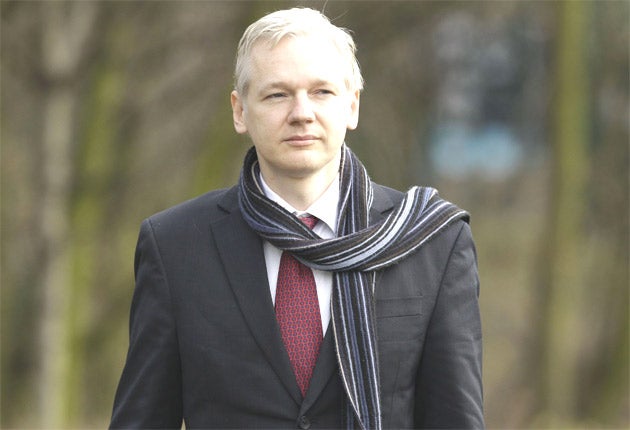It's good to get out of the house, Assange tells Cambridge Union

He has perfected the art of spilling other people's secrets, but Julian Assange's appearance last night at the Cambridge Union Society (CUS) was a far from transparent affair.
The layers of security surrounding the talk – his first public appearance since last month losing round one of his battle against extradition to Sweden – were so tight that the US State Department might have learned a thing or two about how to control the flow of information. Pasted on the walls outside the debating chamber were stern warnings to any students intending to live stream the contents of the WikiLeaks founder's lecture. "It is illegal to film, photograph, or record," the signs read. "You will be evicted and have your membership revoked."
Student journalists from the university's two papers were permitted to attend. But national media were told they were barred from the lecture, which was both a defence of WikiLeaks and a detailed account of what Mr Assange claimed was his organisation's crucial role in sparking pro-democracy protests in the Middle East.
Referring to the fruit-seller from Tunisia who set himself alight in protest at government corruption, Mr Assange said: "His act took what was an online [campaign] about what was happening in Tunisia and expressed it in physical form. The cables showed the US would support the military over the Tunisian regime. This changed the dynamic between reformists and regimists."
In front of a packed debating chamber, Mr Assange expressed fears that cyberspace had its limits and was used by repressive states to monitor opposition voices as much as it is to leak important information. "While the internet has a massive power to hold government to account, it is also the greatest spying machine ever made," he said. "It is not a technology that favours freedom of speech."
At the start of his speech, however, Mr Assange, who is under strict bail conditions, had expressed misgivings about the restriction on reporting. "It seems to me that their restriction on recording is a bit rough, but I support it to a degree," he said. "Otherwise it would have become a press conference." In a reference to his bail conditions he remarked that it was good "to get out of the house".
One of the country's most famous debating chambers, the CUS has hosted Winston Churchill, the Dalai Lama and Ronald Reagan. "Sometimes we let the press in but most of the time we don't" said CUS president Lauren Davidson. "We are a private members' club, and we aim to give our members the opportunity to engage with the most interesting and influential figures in today's society," she added. When asked whether Mr Assange himself had asked for a media blackout, Ms Davidson replied: "It is a decision we made together."
Among the audience members, themselves, opinions of Mr Assange were sharply divided. "Overall I think what he's done is remarkable," said Jonathan Lee, a 20-year-old maths student from Trinity College. "I think he's shown us that governments try to keep vast amounts of information secret and that most of it should be out in public."
Mr Lee had barely finished speaking when his friend, 18-year-old law student Chris Monk, replied: "Oh come on, most of the stuff that was released we already knew about. And you can't disagree with the idea that some information needs to be kept secret. I mean, what possible good was there in releasing that list of top terrorist targets?"
Others expressed concern about Mr Assange's personal transparency.
"I respect him as a person, for what he has done and what WikiLeaks has published," said Robin McGhee, a 19-year-old Oxford student who lives in Cambridge. "But as someone who stands for openness and transparency, I have serious reservations about how closed he is about his own story."
Mr Assange – a 39-year-old Australian-born former hacker – is appealing against an English magistrate's decision to extradite him to Sweden to answer accusations that he sexually assaulted two women last year.
Mr Assange denies the allegations and says the charges against him are part of a wider political conspiracy to silence his organisation's whistle-blowing activities.
Subscribe to Independent Premium to bookmark this article
Want to bookmark your favourite articles and stories to read or reference later? Start your Independent Premium subscription today.

Join our commenting forum
Join thought-provoking conversations, follow other Independent readers and see their replies